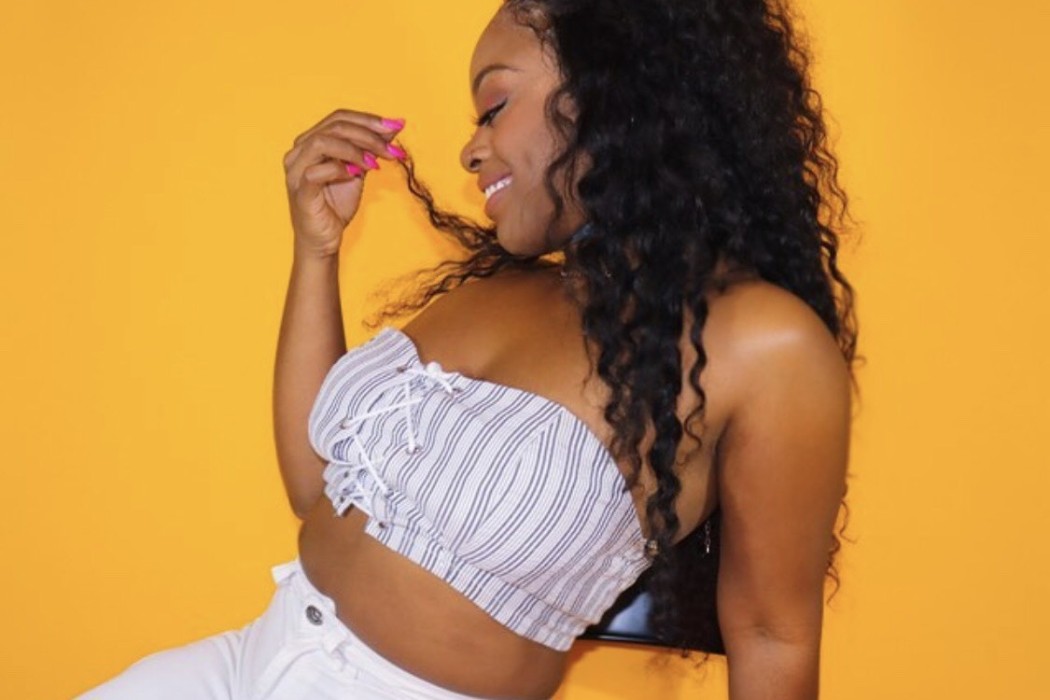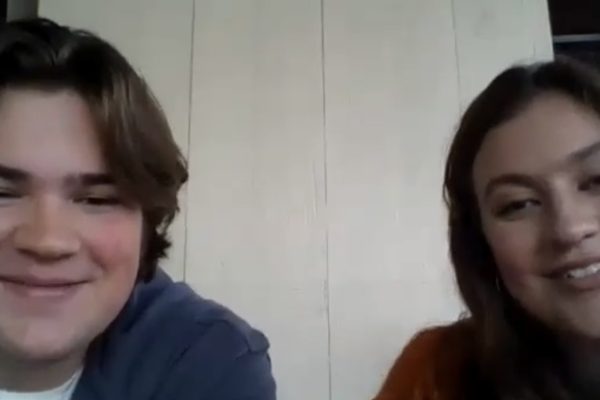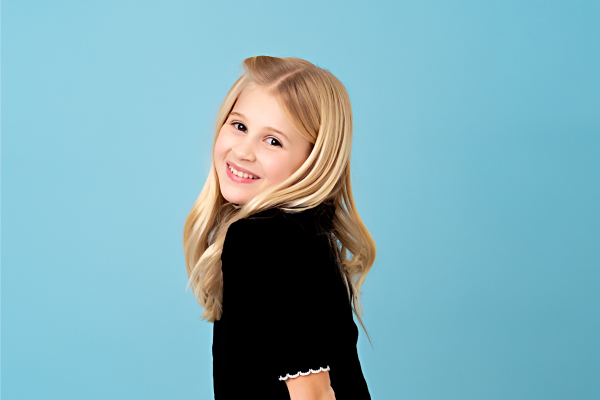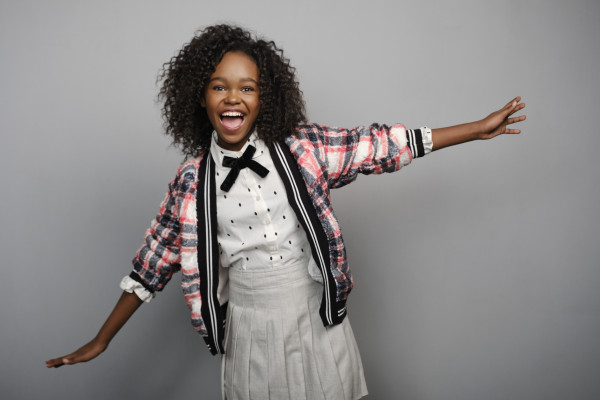When I hop on the phone with Kendra Oyesanya, she’s rehearsing for the BET Awards where she’ll be performing with Cardi B. Outside of those rehearsals, she’s keeping busy through auditioning and taking on dance jobs here and there. Born and raised in Oklahoma City, the dancer/actress has always had the drive, passion, and determination needed to devote herself to these art forms despite not coming from an inherently artistic place.
“I guess since I’m from a small place, I was able to connect with friends and family to push me to go after my dreams and have those manners and treat people well,” Kendra looks back on her upbringing. “Coming in an industry like this will eat you up alive. Being from home just helped me stay really grounded and wish more and not judge people.”
Her background having danced in church as a foundation also helped her, as she explains to stay strong and keep her faith while trying to break through. When her pastor preached sermons, there was always a dance story to go with it which allowed the incorporation of different dance styles including hip hop.
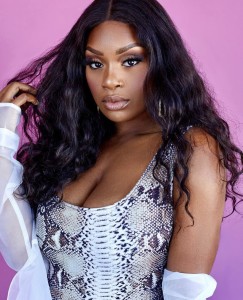 “Obviously, it’s better to be trained because you have that foundation. Especially if you’re training in ballet or jazz, it’s the foundation for other styles like hip hop and jazz funk because it really keeps your core strong and helps you to be balanced.” With training, Kendra says the benefit is that it can transfer to multiple forms of dance. That said, not being formally trained also has it’s positives she notes from experience. “With not being trained, it looks more real, you can feel it more, it’s more natural, it’s raw: it’s something you can’t teach someone, you just have it. So it’s been a plus for me not having the training because it’s something that I guess people see in me that you can’t teach,” she thanks God for her dancing ability.
“Obviously, it’s better to be trained because you have that foundation. Especially if you’re training in ballet or jazz, it’s the foundation for other styles like hip hop and jazz funk because it really keeps your core strong and helps you to be balanced.” With training, Kendra says the benefit is that it can transfer to multiple forms of dance. That said, not being formally trained also has it’s positives she notes from experience. “With not being trained, it looks more real, you can feel it more, it’s more natural, it’s raw: it’s something you can’t teach someone, you just have it. So it’s been a plus for me not having the training because it’s something that I guess people see in me that you can’t teach,” she thanks God for her dancing ability.
In 2013, Kendra won Pepsi’s “Dance for a Chance” contest. The opportunity gave her the chance to work with Beyoncé’s choreographer Chris Grant, meet Beyoncé, and see her show front row. Flash forward a few years from Chris Grant being the one to convince her she should move to LA and pursue dance professionally, Kendra ended up being a part of Beychella, something she agrees is a full circle moment when I ask about it. “She has evolved so much and grown into an artist and just a household name and got even bigger,” Kendra reflects. “To be a part of Coachella where people are saying this is the best show she’s ever had, it’s just crazy that I’m a part of that history. I’m a part of the biggest show that Beyoncé has ever had. So, it’s cool to see she’s gotten that big from me winning the contest and also that I’m a part of it as well.”
Talking a little more about Beychella, Kendra says that one of the biggest things she’s learned from Beyoncé is her work ethic. “I was in rehearsal with her for 2 months, but other people were workshopping before me. So it was 4-6 months rehearsing for this one show and I’ve been on tour before. I didn’t even rehearse that much on tour going from city to city. To see that she put in this much work for one show inspired me so much and made me see what it really takes to be on that level to really make things happen. She did that. She inspired all of us and made us really work harder and push ourselves to rehearse,” Kendra remembers.
To see that [Beyoncé] put in this much work for one show inspired me so much and made me see what it really takes to be on that level to really make things happen. She did that.
As noted in the Netflix documentary Homecoming, throughout the preparation and rehearsal process for the performance, Beyoncé was not only keeping a close eye on just about every single detail, she was also adjusting to life with her new twins, returning back to herself, and dieting, “It made me think like, if I am complaining about all the stuff I have going on, Beyoncé was doing all of this Coachella rehearsals while doing all this and having all these problems, I can make it through,” Kendra recalls. “So that’s a lesson I learned: knowing what it really takes to do something like that.”
At the time of preparing for Beychella, Kendra was going through her own life changes as well. Around the time she booked her first acting gig as Poppy Martinez on Step Up: High Water, her dad was diagnosed with kidney failure and heart failure. When she booked Beychella, her dad passed away. Already, she had been battling with following her dreams living out in LA and wanting so badly to be with him back home. To keep herself busy from worrying, she started making Instagram videos dancing (such as her viral Black Panther video which kickstarted the #BlackPantherChallenge) so she could stay busy and creative. “I just wanted to be with him and talking with my family, even though my dad wasn’t able to speak and probably didn’t know I was there most of the time, I know that he would’ve wanted me to continue to chase my dreams. So I was very fortunate, one of the best jobs of my life, being with Beyoncé then I lost my dad during it. It was super tough, I was thankful that the choreographer and the team allowed me to be away for as long as I could,” she tells me.
Kendra adds that the moment she got on that stage, she knew her dad was in the audience watching her, “It was super tough but it made me stronger and it pushed me more and now my job is always to make sure I’m making him proud.”
I note to her that watching Beychella when it first streamed and then watching Homecoming, the sense of community and family felt apparent and was one of the reasons the performance spoke to me and others. I ask her what it was like to lose someone so close to her while gaining this other family. She admits she was scared to come back because she was worried whether or not everyone knew. “They did let the dancers know so when I got back, everyone was just hugging me all the time and things like that. Like, they gave me my space but they just all let me know that they were praying for me. Everyone was really looking out for me as well.”
“When I watched it on Netflix, I was actually like, ‘Man, I can’t believe I went through all of that during it,'” she looks back. “It was emotional for me too because I was like reminded of what happened during it. But yeah, everything happened for a reason.”
Switching gears to her choreographed viral videos, the first one being for Black Panther and the other one being for Jordan Peele’s Us, Kendra not only choreographed but directed and edited among other behind the scenes jobs. “For those two videos, we did them literally the first day the movie came out. Like Us, I did that before I even saw the movie. I did that solely on the trailer alone but I was inspired by the trailer because the concept was so genius; what Jordan Peele did having the music with the sinister ‘Five on It’ beat? Just him recreating that and making it like this creepy and crazy mix was so cool to me and what made me want to do that.”
“For Black Panther, it was cool because we shot it right after the movie. We wanted it to be about culture, to be about movement, to be about unity and that’s exactly what it did.” Kendra excitedly and humbly talks about unintentionally starting a movement with the video and how other people started doing their own challenges inside movie theaters. She notes that it was important for those watching the video to know that it was for the culture and about spreading awareness on the amazingness and broadness of African culture. “I’m half Nigerian so just watching Black Panther and seeing it about African culture and stuff like that, it was cool to me. [But] most movies inspire me in different ways. It’s probably because it was a very genuine way of me putting my creative touch to it is probably why it empowered the way it was because I didn’t do it to go viral, I really did it because I feel connected to those movies.”
We wanted it to be about culture, to be about movement, to be about unity and that’s exactly what it did.
Talking a little more about the dance world and the inner workings of that, I ask if she can expand on her notion about the importance of what someone can bring into a room and offer in creative settings. For her, she notes that she’s learned that she carries personality. “I’ve told a lot of people when they’re auditioning for things that a lot of times it’s not really about your talent. Your personality can win the room, your personality, just being yourself, what makes you stand out from other people is what a lot of casting directors and choreographers are looking at. What I’ve heard about me is that there’s something about me that people like and that they like my smile and that I light up the room or I’m very social and that just helps me with being myself.”
“I’ve always been like this before I moved to LA and got into this career and I feel like a lot of people when they move to LA feel like they have to be a certain way they have to be around certain people and I don’t really care. I’m not going to be buddy-buddy with some person in the hopes they put me on,” she notes that regardless if someone is a CEO or a janitor, she’ll still be nice and respectful. “I’m the very nice, fun, silly, goofy girl so when I’m around people I’m fun, goofy, and silly,” she laughs, “so I think that also helped me to get the jobs.”
“I know when I first moved to LA to be a dancer, I remember choreographers telling me with me being dark-skinned I’m going to have to work like 10x harder than the other dancers,” she says when I ask her if the dance industry has gotten better with hiring more people with different skin colors and body types besides lighter and thinner which she notes has been helped by social media. “For someone to hear that, you’ll be like, ‘What? I gotta work 10x harder?’ It’ll instantly make you insecure and make you feel like you’re not gonna make it because you’re not light enough or even just being small. I came out here a thick girl and I’m still a thick girl, you know, I’m from the country so we eat,” she laughs. “So it’s hard because like I’ve always been this size, like yes I’ve lost weight but then my weight is always up and down. Like some things, I just can’t hide and my pride and why I think being yourself is just like something in you is they look past that and really help me feel like I didn’t have to just be super skinny.”
In terms of colorism in the dance industry, she notes, “Now it’s like I may be the only dark skinned girl that’s probably hired but at least it’s like I’m in there. It wasn’t before where it’s like all light-skinned chicks. Now it’s like, ‘Okay, she can be in here.’ You know, the dance world is weird because they have to have like all these shades and things like that where they want to make sure they have like every color like white girl, light skin girl, dark skin girl so I’ve been noticing like, ‘Oh, I’m the only dark skinned girl on this job.'”
She brings back up the notion about being told to work 10x harder than others because of her look and how she made sure that the most important thing she delivered was being herself. “I’m glad they did tell me that but I didn’t let that stop me,” she says looking on an optimistic note. “Even with Beyoncé, there were two sisters that did Coachella that were bigger girls and they were like center with Beyoncé like on Beyoncé’s side and that has not happened before. So it’s cool now with the years coming up that they’re starting to give people chances with all body types and all colors. Even with actors too, you don’t have to be the super pretty person, they want regular looking people nowadays so, it’s pretty cool to be the change in the industry where you don’t feel like you have to look a certain way.”
I’m the very nice, fun, silly, goofy girl so when I’m around people I’m fun, goofy, and silly.
 I ask her if from her experience does it seem like there’s usually an assumption about a dancers ability based on their skin color. Kendra admits that it feels like the expectation is for darker skinned girls to do the ‘ratchet stuff’ or twerking while the lighter skin girls get to be the ones closer to the artist in their videos. “It’s sad that people do think that way,” she concludes sharing that she does feel like at least it has gotten a lot better. Kendra also explains why jobs might regress to colorism, “A lot of the times they’re booking people off of their pictures, not their talent. Like yeah, you have an audition but then the day they put your headshot up, they’re looking at like who looks ‘good’ with the artist and who looks ‘good’ with each other and things like that. But I feel like lately, it has been getting more diverse which is good. But, I think they assume that certain people–not a lot–but some assume they do certain styles because of like their skin color.” She adds noting that even when they might not flat out say it, the coded language can be blatant, “But I think deep down sometimes it’s like, ‘Oh, we want some hood girl,’ they’re probably gonna grab some dark-skinned chick.”
I ask her if from her experience does it seem like there’s usually an assumption about a dancers ability based on their skin color. Kendra admits that it feels like the expectation is for darker skinned girls to do the ‘ratchet stuff’ or twerking while the lighter skin girls get to be the ones closer to the artist in their videos. “It’s sad that people do think that way,” she concludes sharing that she does feel like at least it has gotten a lot better. Kendra also explains why jobs might regress to colorism, “A lot of the times they’re booking people off of their pictures, not their talent. Like yeah, you have an audition but then the day they put your headshot up, they’re looking at like who looks ‘good’ with the artist and who looks ‘good’ with each other and things like that. But I feel like lately, it has been getting more diverse which is good. But, I think they assume that certain people–not a lot–but some assume they do certain styles because of like their skin color.” She adds noting that even when they might not flat out say it, the coded language can be blatant, “But I think deep down sometimes it’s like, ‘Oh, we want some hood girl,’ they’re probably gonna grab some dark-skinned chick.”
Her show Step Up: High Water which airs on Youtube Red aired its season two earlier this year. (While there is current talk about season 3, Kendra shares that they’re all still waiting on a full confirmation.) An addition to the Step Up franchise, this installment starts off following twins Tal (Petrice Jones) and Janelle (Lauryn McClain) once they move to Atlanta and get involved with a group of students at the competitive contemporary arts school High Water. As the show continues, the focus has extended to allow the other characters to develop one of them being Kendra’s character Poppy.
“I feel like I’ve grown a lot playing the role of Poppy. She is very confident, very real, very outspoken and blunt. She feels like she can take on anybody on the dance floor–like she can get down with anybody, she’s not afraid,” Kendra describes her character. “She’s helped me in my real life because I wasn’t always so outspoken, I wasn’t always confident in playing this confident girl like it really rubbed off on me in a great way because now I’m able to speak up on things and now I feel confident. Now I feel like I can hang with anybody on the dance floor, you know what I mean? Where I didn’t before playing her.”
In terms of how she’s influenced how Poppy has gotten to grow, she jokes that in the beginning, Poppy started off essentially as the girl that cusses a lot and would be called by others as, “the ‘b-word’ of the show,” she says. “I feel like I brought the sweet side of Poppy because she starts off in season one as like the girl you don’t really like and then as the season goes on, you grow to love her. I feel like I really brought that on and you know the writers wrote the script, but also me playing her as someone you don’t really understand. She’s going through stuff with her mom and things like that so I feel like I kind of brought that to Poppy: the softer side of her,” Kendra explains. “I’m glad that they allowed my character to just grow from being a little girl on season one to now she’s there like a young woman in season two which is really cool to see.”
Finishing up our interview, I ask her about what she’d want to tell her younger self if she could. She thinks for a moment then starts, “I would tell my younger self that you accomplished some great things. You did what other people wouldn’t do coming from Oklahoma City. You did what people were afraid to do. You chased your dreams and you lived and you made people proud and you inspired people and you danced with the biggest artists and you’re still going and that you did it.”
~~~
You can stay up to date on all things Kendra Oyesanya by following her Twitter, Facebook, and Instagram accounts.
Beyoncé: Homecoming is available to watch on Netflix.
Seasons one and two of Step Up: High Water are available to watch on Youtube Red.

